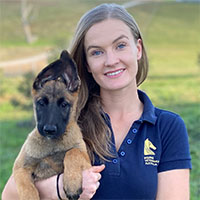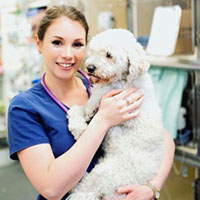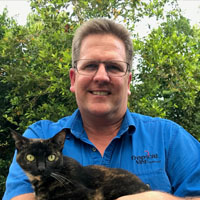Fast Facts
Location
Commencing
- Townsville: January
Fees
$11,920.00+
+estimated annual Commonwealth Supported Fee for a full-time study load. Please note this estimate is variable and subject to fluctuation depending on choice of elective subjects.
Plus Student Services and Amenities fee
Fee deferral and scholarships available if eligible
Currently displaying fees for 2025, which are subject to change in following years.
Duration
5 years full-time
Entry Requirements
English, Mathematical Methods, Chemistry (Units 3/4,C)
Recommended Knowledge
Biology (Units 3/4,C)
QTAC Codes
- 317051
Course detail
Become equipped with the skills to diagnose, treat, manage, and prevent disease in a wide range of companion, production, aquatic and native animals. You will gain strong foundational knowledge throughout your degree, as well as specialised rural and tropical veterinary science skills.
Discover how you can promote and optimise the health and welfare of communities, animals and their environment through studies in epidemiology, zoonoses and public health. As a student of JCU’s Bachelor of Veterinary Science degree, you will learn how to improve the health status of individual animals and populations and analyse, formulate and communicate solutions to complex disease problems using a One Health approach. You’ll gain hands-on experience in implementing and monitoring treatment and management plans as well as see demonstrations of consultation with clients, carers, animal owners and communities.
Explore the strength of JCU’s continued commitment to empowering regional communities and the students within them through the Rural Access Scheme (RAS). If you live or have previously lived in a rural or remote area of Queensland, you may be eligible for a rural place in the Bachelor of Veterinary Science (Honours) at JCU. Learn more about the Rural Access Scheme and the application process today.
Take advantage of JCU’s real-world teaching settings, including an on-campus Veterinary and Emergency Centre and Hospital, a local working cattle station and access to several specialist and diverse veterinary practices. In your final two years, you will complete a variety of clinical placements in both rural and urban veterinary practices.
Upon graduation, you will be a veterinarian equipped to deliver safe and effective health care by working effectively in and across diverse veterinary teams. You’ll be able to identify problems related to animal and public health and lead in the formulation and application of solutions that are appropriate and sustainable in tropical or rural environments.
NOTE: Students wishing to commence a Bachelor of Veterinary Science (Honours) in 2025 should note that face to face teaching for this course begins 27 January 2025. Students must enrol in the core subjects TV1101: Introduction to Veterinary Science; TV1102: Cell Biology and Biochemistry for Veterinary Science and Agriculture and AG1007: Introductory Plants and Animals for Veterinary Science. These subjects are available in Trimester 1 2025.
View the Handbook for a detailed overview of available subjects, as well as pre-placement requirements.
Additional information
About JCU's Bachelor of Veterinary Science (Honours) in Queensland
Explore the importance of the relationship between people and animals. Prepare to make a difference in the lives of both with your Bachelor of Veterinary Science (Honours) degree from JCU.
A Vet School That Will Get You Ready Today for Tomorrow
Meet tomorrow's demands in sustainable animal farming and increased expectations for animal health and welfare. JCU graduates who study veterinary science are prepared to work with animals and the people who care for them, in many diverse settings. Your Bachelor of Veterinary Science (Honours) in Queensland is accredited by the Australasian Veterinary Boards Council, making you eligible to work in Australia and New Zealand or in the UK.
Choose a field of work that appeals to your interests with your veterinary university studies at JCU. Build your own private veterinary practice with companion animals or livestock. Be part of positive change in the community by serving with or work in animal nutrition or production. Take the lead in exotic animal research and care at a zoo or wildlife sanctuary.
Protect fragile ecosystems through government quarantine and biosecurity programs. Devote yourself to developing new pharmaceuticals to improve animal health, or improving nutrition industries or farmers. Follow your teaching passion with a career in academia or pursuing important research initiatives.
Study Veterinary Science and Work With the Best
Work with one of the world's leading veterinary schools as you pursue your vet degree at JCU. Benefit from state-of-the-art teaching and research facilities at the JCU Veterinary and Emergency Centre and Hospital, the JCU working cattle station (JCU Fletcherview Research Station), and the JCU Teaching Resource Centre.
Expand your knowledge and skills through veterinary courses in Queensland, and experience Australia's unique tropical, marine and rural settings. Graduates have specialist knowledge and unique skills and insights due to their practical experience in rural, remote and marine study locations. Network with the industry through JCU's partnerships with government and agricultural leaders.
Your vet degree will equip you to diagnose and treat animals from a variety of ecosystems. Working alongside lecturers committed to student success, you will graduate ready to work with farm or companion animals, wildlife, and aquatic species.
Experience the Incredible with JCU's Veterinary Courses in Queensland
Experiential learning is integral to success. Your JCU vet school courses include extensive, hands-on teaching as well as clinical and professional placements. Learn how to gather and critically evaluate data to make evidence-based decisions about the animals under your care. Graduate with the practical experience that makes you valuable to employers. Real-world experience in laboratories, veterinary hospitals, on farms and in private practice give you the confidence you need to pursue a successful career.
Be equipped with a thorough understanding of the ethics of veterinary practice and relevant legislation that governs the field. You will work with people from across cultures, learning about key cultural values so you can make a difference in communities. Be a leader in preserving ecosystems for another generation and build your understanding of sustainability.
Prepare for work as a veterinarian with a Bachelor of Veterinary Science (Honours) from James Cook University. Experience a world-class education and experience in the field and graduate with the skills employers are looking for.
Gain Hands-On Experience
Experience has no substitute, and your vet school experience should prepare you for work in the real world. Learn from lecturers committed to student success and then take that knowledge to work in the JCU Veterinary and Emergency Centre and Hospital. Develop your skills at the working cattle station, JCU's Small Animal Clinic, in teaching laboratories, and on professional placements within the community.
Work in state-of-the-art laboratories and in some of Earth's most unusual natural environments. Spend time working in busy urban centres and in rural areas, rainforests, and coastal ecosystems. Learn how to conduct physical exams, diagnose disease, deal with animal dental issues, and conduct research in delicate ecosystems. Become ready to work with animals and the people who care for them in any kind of environment.
Balance Animal Needs and Public Health
Take advantage of JCU's connections with Aboriginal and Torres Strait Islander communities to see where the lives of animals and communities intersect. Learn first-hand how to care for animals while strengthening rural and marginalised communities, all while preserving Australia's unique ecosystems.
Understand how human societies intersect with the ecosystems around them, both depending on those ecosystems and affecting them at the same time. Be a part of developing sustainable solutions that keep communities safe from disease and preserve animal welfare at the same time.
Ready Today for Tomorrow
Study at a veterinary university that prepares you for a variety of exciting career environments. Work in tropical locations, in the outback, on the doorstep of the Great Barrier Reef, and with both aquatic and terrestrial species. Become adept at diagnosing, treating, and preventing disease in animals of all kinds, from household pets to livestock and wild indigenous species.
Take your Bachelor of Veterinary Science (Honours) in Queensland to work in private practice, to support NGOs, or to work in wildlife sanctuaries. Take part in research that matters by working to develop interventions that improve the health of animal patients, or protect the community by advising government leaders and preventing and treating zoological pandemics. Work in animal nutrition, breeding, or conservation to strengthen those communities dependent on their livestock.
Take veterinary courses in Queensland accredited by the Australasian Veterinary Boards Council (AVBC) and graduate eligible to practice in Australia, New Zealand, or the United Kingdom. Or, take your degree and build on it as you pursue further education and greater expertise.
Gain Strong Research Skills
Science is always moving. Learn through your vet degree courses how to identify and then synthesize data, understand that data, and then apply it to solve real-world problems. Develop your skills at communication among peers and others so you can communicate your findings to stakeholders, community leaders, laypeople, and colleagues in the sciences.
Develop a passion for lifelong learning. Lead the way in developing answers to the most pressing problems in your field while keeping up with important developments in research, treatments, and the ethics of veterinary medicine.
Build Your Professional Network
Interact with professionals from a variety of fields as you study veterinary science. Ask questions of some of the leading minds in your own field and work alongside experts in operating theatres, treatment rooms, and in fieldwork. Learn from the best while you take part in research that matters and prepare to make your own important contributions to veterinary medicine.
Interact regularly with classmates and build professional connections you can draw on throughout your career. Develop your skills at group collaboration so you can work with others to improve health outcomes for animals and the human communities that live alongside them and depend upon them.
Gain Your Bachelor of Veterinary Science (Honours) Degree
Prepare for an exciting and fulfilling career with your Bachelor of Veterinary Science (Honours) from James Cook University. Equip yourself to lead the way and meet the exciting challenges that face Australia's unique ecosystems. Gain the knowledge, skills, and hands-on experience you need to stand out from the crowd of jobseekers.Contact JCU today to learn more or get started on the next step to your rewarding career in veterinary medicine.
A Vet Degree From JCU
Take the first step towards your fulfilling, successful career in veterinary medicine. Partner with JCU and make a difference in the lives of companion animals and livestock.
Hide additional information
Inherent requirements
Inherent requirements are the identified abilities, attributes, skills, and behaviours that must be demonstrated, during the learning experience, to successfully complete a course. These abilities, attributes, skills, and behaviours preserve the academic integrity of the University’s learning, assessment, and accreditation processes, and where applicable, meet the standards of a profession. For more information please review the inherent requirements for the Bachelor of Veterinary Science (Honours).
Honours
The Honours component of this degree is embedded into the course.
JCU Veterinary Science (Honours) graduates are internationally recognised as multi-skilled, highly competent professionals who are committed to the health and welfare of animals.
JCU graduates who undertake a career in veterinary science work in a variety of settings, including veterinary clinics, veterinary hospitals, government, universities, pharmaceutical industries, agriculture, biosecurity, quarantine, public health, zoos and wildlife sanctuaries.
Alternatively, upon graduation, you may wish to pursue research in animal science or explore research opportunities in other fields such as allied health.
Successful completion of a Bachelor of Veterinary Science (Honours) means you can gain registration to practice as a veterinarian in the following countries:
Australia: The Bachelor of Veterinary Science (Honours) is accredited by the Australasian Veterinary Boards Council, meaning graduates are eligible to apply for registration to work as a veterinarian in any Australian state or territory. Registration applications are made directly to the veterinary board of the state in which you wish to work.
New Zealand: Successful graduates of the Bachelor of Veterinary Science (Honours) are eligible to apply for registration as a veterinarian in New Zealand through the Veterinary Council of New Zealand. Those graduates already registered as a veterinarian in an Australian state or territory are eligible to apply for registration in New Zealand under the Trans-Tasman Mutual Recognition Agreement (TTMRA) provisions.
The United Kingdom: Graduates with a Bachelor of Veterinary Science (Honours) from James Cook University are eligible to apply to the Royal College of Veterinary Surgeons for registration as a veterinary surgeon in the UK. Applicants are required to provide a letter of good standing from the Head of Veterinary Science, or their current licensing authority.
Ireland: JCU’s Bachelor of Veterinary Science (Honours) is a recognised international qualification for the purpose of registration as a Veterinary Practitioner with the Veterinary Council of Ireland (VCI).
South Africa: The South African Veterinary Council (SAVC) recognises James Cook University’s Bachelor of Veterinary Science (Honours) as an international qualification eligible for automatic registration. Those who are registering with SAVC as a veterinarian for the first time are required to complete a one-year Compulsory Community Service (CCS) program.
Entry score threshold
These are the lowest adjusted scores we made an offer to in Semester 1, 2024. Entry scores are based on the most recent Semester 1 intake and are updated in June each year. Meeting the threshold doesn't guarantee admission.
ATAR/Selection Rank: Special entry requirements
Entry score range
This table shows the range of entry scores for recent secondary students offered a place in the Bachelor of Veterinary Science (Honours) for Semester 1, 2024. The table includes offers deferred to Semester 1, 2024 which may have been assessed using the entry score threshold of an earlier year.
JCU Townsville
Without adjustments | With adjustments* | |
|---|---|---|
Highest | 99.35 | 99.35 |
Median | 93.70 | 93.70 |
Lowest | 81.35 | 81.35 |
Notes:
<5 – indicates less than 5 OP/ATAR-based offers made.
NP – indicates figure is not published if less than 25 ATAR-based offers made.
* Refer to Adjustment Factors
Find out more about who you might study with by viewing this course’s student profile.
Estimated annual Commonwealth Supported fee: $AUD11,920.00
A variety of Scholarships are available to suit different student types.
JCU Prep is an available pathway into this course. Successful completion of this flexible program can enable you to meet subject prerequisites for this degree. Introductory academic subjects are also available to prepare you for tertiary study.
Contact our friendly JCU Future Students Team to find out more.
You need to submit applications via the QTAC Portal and the JCU Application Portal for the Bachelor of Veterinary Science (Honours).
Follow the steps outlined in the process to prepare and apply for Medicine, Dentistry and Veterinary Science courses at JCU.
Application deadlines and starting dates for Veterinary Science are different to other JCU courses. Check the table of important dates for those relevant to Veterinary Science applications.
Real stories
-

Student
Zoe Walker
Bachelor of Veterinary Science
I think what really makes this degree special is the staff. They are so incredibly passionate about helping you to become a good vet and they really go above and beyond for you. I also had the opportunity to be a student volunteer at the Equine Veterinarians Australia conference, which was a great experience.
-

Student
Aaron Lau
Bachelor of Veterinary Science
The best part of the degree has definitely been all the places it has taken me. The rural focus really pushed me to explore parts of the country that I never would have otherwise travelled to. This degree has given me an appreciation of the myriad possibilities there are for vet work in this country.
-

Alumni
Dr Brooke Schampers
Bachelor of Veterinary Science
My time at JCU shaped my future as a veterinarian. For me, the biggest aspect was learning basic surgery skills from second year. It meant that I was more prepared and confident for clinical placements. This interactive, hands-on learning is one of the unique training aspects which makes JCU graduates stand out.
-

Lecturer
Professor John Cavalieri
Academic Head, Veterinary Sciences
JCU’s unique location means that students gain experience with issues and animals that are relevant to working in rural, remote, and tropical regions. This, combined with our practical, hands-on approach to learning, means that our students are ready for the real world the day they graduate.
-

Employer
Dr Graham Lauridsen
Director - Tropical Vet Services
We try first and foremost to recruit JCU graduates as they are well trained and have the practical skills necessary to work in the field. They make a great fit for our team because they are familiar with the North Queensland way of life.